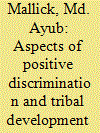| Srl | Item |
| 1 |
ID:
151100


|
|
|
|
|
| Summary/Abstract |
Protective policies are essential for individual development and group mobility.
Positive discriminatory efforts seek to reduce group inequalities and to rectify
the consequences of group discrimination. Reservations in the fields of politics,
education and employment aimed at protecting tribal culture and tradition have
achieved strikingly little. Protection of land and life support system has been
poorly implemented. There have been no marked improvements in their social
conditions. Planned intervention has not improved the occupational and educational
levels of tribals. Non-tribals do not treat them equally. Apart from developing
entrepreneurship, follow-up action in providing developmental benefits to
tribals should be made. The single-stroke formula of providing loans and facilities
is unsuited to the development needs of the area. Social capital formation
is needed to ensure justice, or to provide socio-economic justice, which was
traditionally present in the tribal economy and society.
|
|
|
|
|
|
|
|
|
|
|
|
|
|
|
|
| 2 |
ID:
151102


|
|
|
|
|
| Summary/Abstract |
The Awami League (AL)-led Grand Alliance came to power with a ‘Charter
for Change’ in 2009 in order to ensure good governance in Bangladesh. From
2009 to 2012, the government has taken various steps to make the civil service
efficient and capable. This article strives to explore what the AL government
has done to manage the civil service during 2009–12. The article analyses newspaper
articles on the AL government’s actions on recruitment, promotion, and
transfer. It also analyses the role of the media in exposing the state of the civil
service management by conducting structured interviews of purposively sampled
respondents. The article shows that the AL-led government has manoeuvred the
civil service through partisan decisions on recruitment, promotion and transfer,
which have left the civil service management in disarray
|
|
|
|
|
|
|
|
|
|
|
|
|
|
|
|
| 3 |
ID:
151101


|
|
|
|
|
| Summary/Abstract |
Women representation in decision-making and law-making is considered as
a vital step in women empowerment. The Martial Law regime of General
Pervez Musharraf1
brought in a drastic change in the composition of Pakistani
legislatures at both central and provincial levels and has increased 17 per cent
of reserved seats for women in 2002. However, this was much less than
the 33 per cent stated in Strategic Objective G-2 in the plan. This step was
deemed as a landmark in materialising the long-cherished dream of empowering
Pakistani women. The purpose of this study is to assess the discourse
on women’s political empowerment and their level of participation in mainstream
politics by analysing the gender gaps in the Election Laws—General
Elections of 2002, 2008 and 2013. Women are now present in all the legislative
assemblies of Pakistan from more than a decade. How far this change
has remained useful in addressing and solving the problems faced by Pakistani
women? Furthermore, how these women legislators have performed on specific
women-related issues or is this step just an extension of strengthening the
dominant families in Pakistani politics? The issue of quota discourses in the
Parliament is also discussed.
|
|
|
|
|
|
|
|
|
|
|
|
|
|
|
|